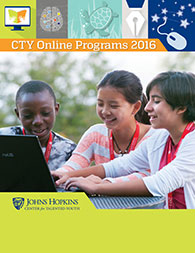Difference between revisions of "Problem Solving in Arithmetic"
(Created page with "{{CTY Online Courses}} Problem Solving in Arithmetic is a CTY Online which has a prerequisite of a quailifying score on the mathematics of the SCAT or SAT and completi...") |
|||
| Line 1: | Line 1: | ||
{{CTY Online Courses}} | {{CTY Online Courses}} | ||
| − | [[Problem Solving in Arithmetic]] is a [[CTY Online]] which has a prerequisite of a | + | [[Problem Solving in Arithmetic]] is a [[CTY Online]] which has a prerequisite of a qualifying score on the mathematics of the SCAT or SAT and completion of 5th grade math. Its course code is [[PS1]] and its course length is about 3 months. |
==Course Description== | ==Course Description== | ||
Revision as of 21:31, 11 February 2016
Problem Solving in Arithmetic is a CTY Online which has a prerequisite of a qualifying score on the mathematics of the SCAT or SAT and completion of 5th grade math. Its course code is PS1 and its course length is about 3 months.
Contents
Course Description
CTY's Problem Solving and Enrichment Math courses sharpen investigative skills, broaden mathematical understanding of concepts, and enhance reasoning skills. Designed around performance objectives that reflect national and state mathematical standards and drawing on software provided by Riverdeep, these courses demonstrate how mathematical issues arise out of real-life situations. Concepts are assessed through challenging quizzes and module tests. With the guidance of their instructors, students typically select enrichment or supplementary math courses of the appropriate level in between their accelerated courses to ensure a solid foundation and mastery of math concepts at each level.
Problem Solving in Arithmetic is intended for students who have a good understanding of elementary arithmetic and wish to broaden their skills by solving interesting word problems. Students investigate properties of fractions, decimals, percents, integers, and order of operations, and explore the rules that govern math operations through interactions, practice problems, and workout exercises. Students are also invited to participate and ask questions in an open Help Room guided by instructors.
This course is most appropriate for students at the fifth and sixth grade level. It provides a solid foundation for students who will be advancing into Honors Pre-algebra.
Topics
Module 1: Fractions
- Essentials of Fractions
- Recognizing a Fraction
- Exploring Proper and Improper Fractions
- Working with Mixed Numbers
- Equivalent Fractions
- Identifying the Factors of a Number
- Expressing Fractions in Lowest Terms
- Writing and Comparing Equivalent Fractions
- Multiplying Fractions
- Finding Products of Fractions, Whole Numbers, and Mixed Numbers
- Using the GCF in Finding Products
- Representing Multiplication
- Dividing Fractions
- Estimating Quotients of Fractions
- Using Multiplicative Inverses
- Solving Missing Value Problems when Dividing Fractions
- Adding Fractions
- Adding with Like Denominators
- Adding with Unlike Denominators
- Solving Missing Value Problems when Adding Fractions
- Subtracting Fractions
- Subtracting with Like Denominators
- Subtracting with Unlike Denominators
- Solving Missing Value Problems when Subtracting Fractions
Module 2: Decimals
- Essentials of Decimals
- Investigating Decimal Place Values
- Rounding Decimals
- Exploring Repeating and Terminating Decimals
- Adding and Subtracting Decimals
- Using Place Value Grids
- Regrouping with Whole Numbers
- Regrouping to Hundredths
- Multiplying Decimals
- Multiplying Decimals by Powers of 10
- Calculating Products
- Finding the Volume of a Prism
- Dividing Decimals
- Dividing Decimals by Whole Numbers
- Estimating and Finding Quotients
- Dividing by Powers of 10
Module 3: Percents
- Essentials of Percents
- Investigating the Meaning of Percent
- Expressing Percents as Proper Fractions
- Expressing Percents Greater than 100% as Improper Fractions
- Finding Percents of Quantities
- Finding Percents of a Whole
- Expressing Ratios as Percents
- Calculating the Whole from a Part and a Percent
- Increasing and Decreasing Percents
- Calculating Percent Increases
- Calculating Percent Decreases
- Calculating Simple Interest
Module 4: Integers and Order of Operations
- Adding and Subtracting Signed Numbers
- Exploring the Number Line and Absolute Value
- Adding with Absolute Value
- Subtracting with Absolute Value
- Multiplying and Dividing Signed Numbers
- Finding Products of Signed Numbers
- Representing the Multiplication of Signed Numbers
- Finding Quotients Using Reciprocals
- Order of Operations
- Simplifying Expressions
- Introducing the Distributive Property
- Using Grouping Symbols
